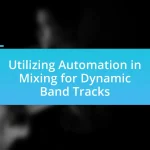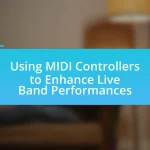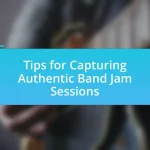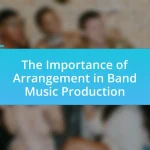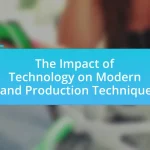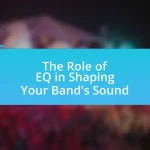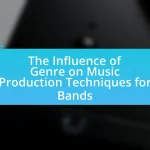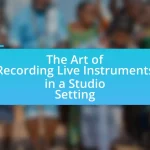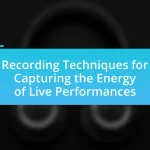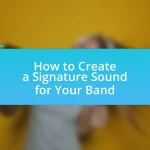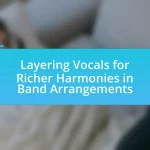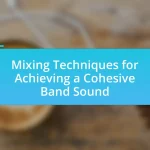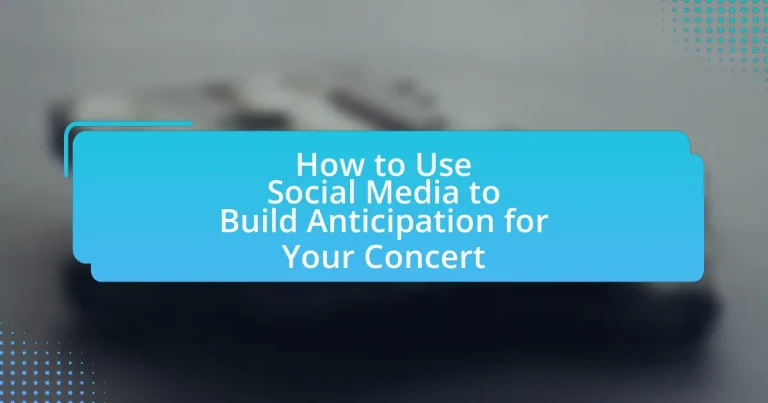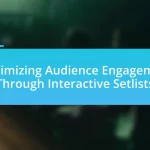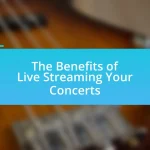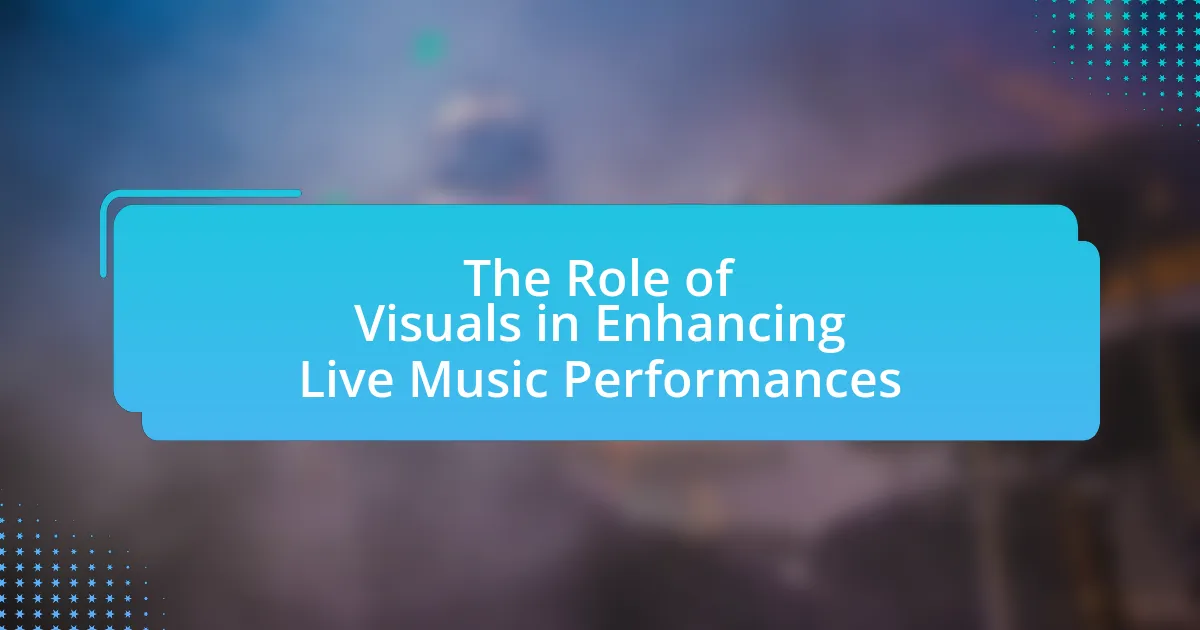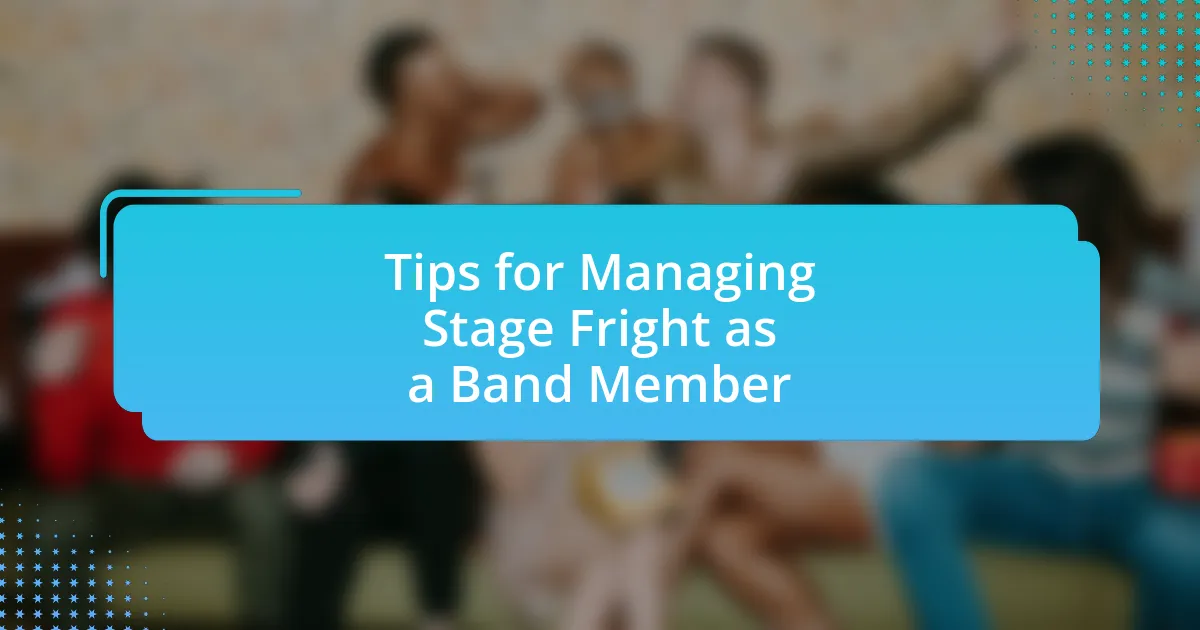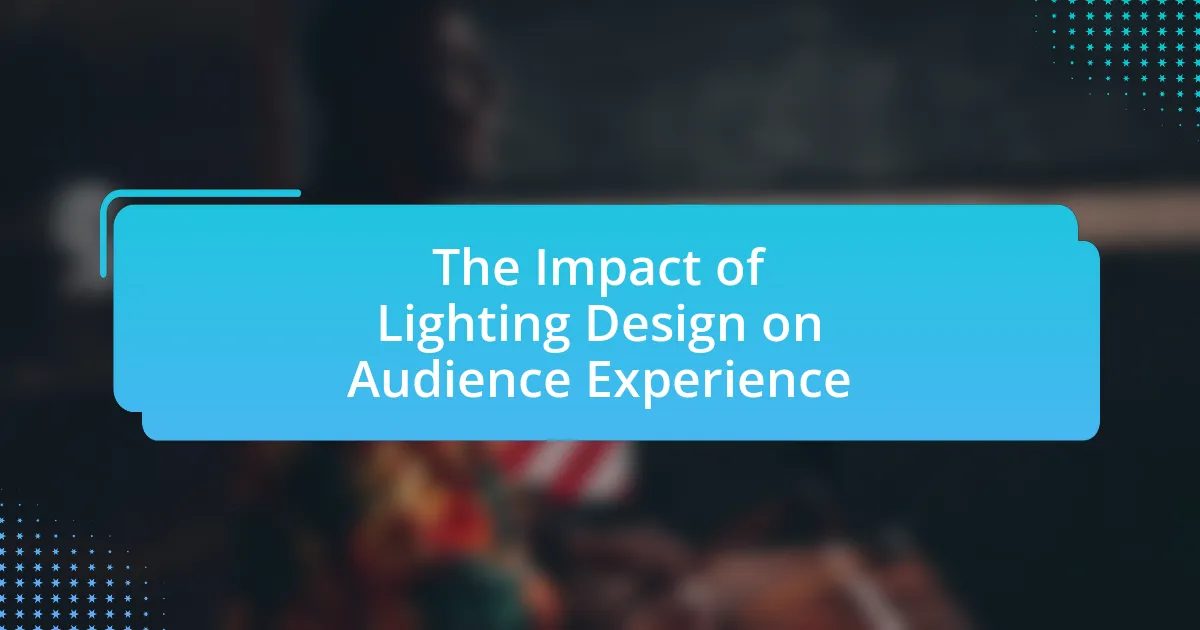The article focuses on how social media can effectively build anticipation for concerts. It outlines strategies for engaging audiences through targeted content, interactive campaigns, and the use of various platforms such as Facebook, Instagram, Twitter, TikTok, and YouTube. Key aspects discussed include the importance of audience engagement, the role of influencers, and the effectiveness of countdowns and teasers in driving ticket sales. Additionally, the article emphasizes the significance of measuring engagement metrics and adapting strategies based on audience feedback to enhance promotional efforts and ensure concert success.
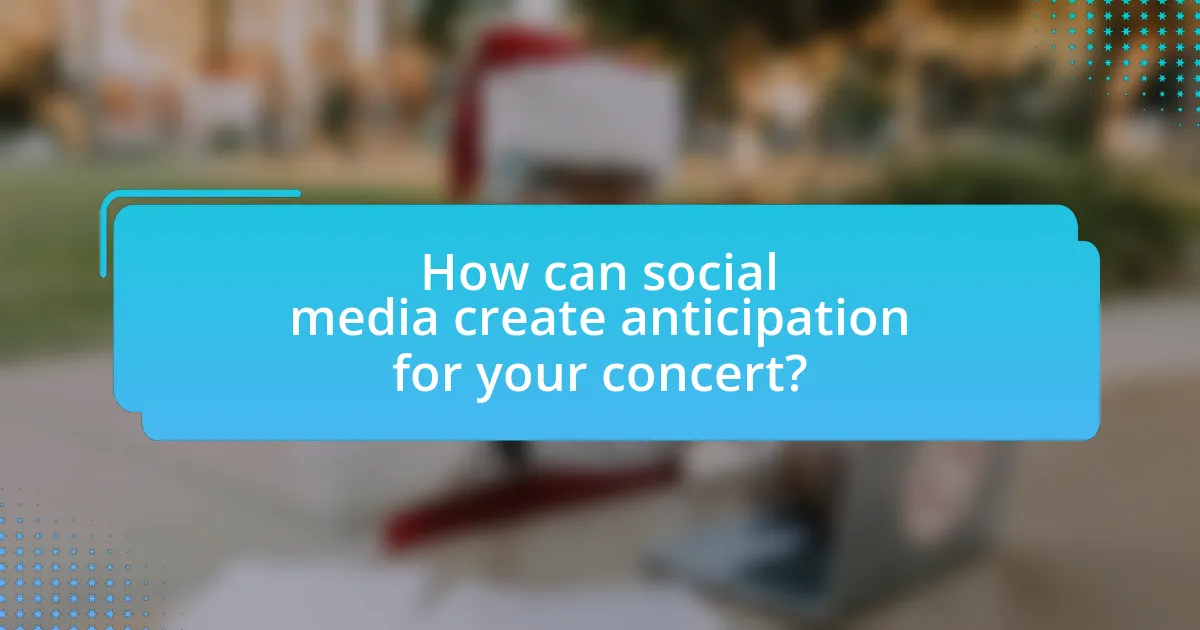
How can social media create anticipation for your concert?
Social media can create anticipation for your concert by engaging your audience through targeted content and interactive campaigns. By sharing behind-the-scenes footage, teasers, and countdowns, artists can build excitement and keep fans informed about concert details. For instance, a study by Eventbrite found that 80% of event attendees are influenced by social media when deciding to attend an event, highlighting its effectiveness in generating buzz. Additionally, utilizing platforms like Instagram and Twitter for live updates and fan interactions fosters a sense of community, further enhancing anticipation.
What are the key social media platforms to consider?
The key social media platforms to consider are Facebook, Instagram, Twitter, TikTok, and YouTube. Facebook is essential for event promotion and community engagement, with over 2.9 billion monthly active users. Instagram excels in visual storytelling, making it ideal for sharing concert teasers and behind-the-scenes content, with over 1 billion users. Twitter allows for real-time updates and interaction with fans, boasting 450 million monthly active users. TikTok is rapidly growing, particularly among younger audiences, and is effective for viral marketing, with over 1 billion users. YouTube serves as a platform for music videos and live streams, reaching over 2 billion users, making it crucial for engaging fans through video content.
How does each platform cater to different audiences?
Different social media platforms cater to various audiences through their unique features and user demographics. For instance, Instagram primarily attracts a younger audience, focusing on visual content, which is ideal for promoting concert visuals and engaging fans through stories and reels. Facebook, with its broader age range, allows for detailed event pages and community engagement, making it suitable for reaching diverse demographics and fostering discussions around concerts. Twitter serves a fast-paced environment, appealing to users who seek real-time updates and interactions, which is effective for sharing concert announcements and engaging in conversations. TikTok, favored by Gen Z, leverages short, creative videos, making it an excellent platform for viral marketing and engaging younger fans through challenges and trends related to concerts. Each platform’s distinct characteristics enable targeted marketing strategies that resonate with specific audience segments.
What unique features do these platforms offer for concert promotion?
Concert promotion platforms offer unique features such as targeted advertising, event countdowns, and social sharing capabilities. Targeted advertising allows promoters to reach specific demographics based on location, interests, and behaviors, increasing the likelihood of ticket sales. Event countdowns create urgency and excitement, encouraging fans to purchase tickets before they sell out. Additionally, social sharing capabilities enable users to easily share events with their networks, amplifying reach and engagement. These features collectively enhance visibility and drive attendance for concerts.
Why is building anticipation important for concert success?
Building anticipation is crucial for concert success because it generates excitement and increases ticket sales. When fans are engaged through social media campaigns, teasers, and countdowns, they are more likely to share their enthusiasm, creating a buzz that attracts a larger audience. Research indicates that events with strong pre-event marketing can see ticket sales increase by up to 30%, demonstrating the direct correlation between anticipation and financial success.
How does anticipation affect ticket sales?
Anticipation significantly boosts ticket sales by creating excitement and urgency among potential attendees. When fans are eager for an event, they are more likely to purchase tickets quickly to secure their spot, often leading to sell-out shows. For instance, a study by Eventbrite found that events with a strong pre-event marketing strategy, which builds anticipation, can see ticket sales increase by up to 30%. This demonstrates that effective anticipation strategies, such as teasers and countdowns on social media, directly correlate with higher ticket sales.
What role does audience engagement play in anticipation building?
Audience engagement is crucial in anticipation building as it fosters a sense of community and excitement among potential attendees. Engaging with the audience through social media platforms allows event organizers to share updates, behind-the-scenes content, and interactive posts that stimulate interest and conversation. For instance, a study by the Pew Research Center indicates that 69% of adults in the U.S. use social media, making it an effective channel for reaching and engaging a large audience. This engagement not only keeps the event top-of-mind but also encourages sharing and word-of-mouth promotion, amplifying anticipation as the concert date approaches.
What strategies can be used to build anticipation on social media?
To build anticipation on social media for a concert, utilize countdowns, teasers, and exclusive content. Countdown posts create excitement by marking the days leading up to the event, while teaser videos or images can hint at special performances or surprises, engaging the audience’s curiosity. Exclusive content, such as behind-the-scenes footage or early ticket access, incentivizes followers to stay connected and share the experience. According to a study by Sprout Social, 70% of consumers feel more connected to brands that share exclusive content, reinforcing the effectiveness of these strategies in generating anticipation.
How can countdowns and teasers be effectively utilized?
Countdowns and teasers can be effectively utilized by creating a sense of urgency and excitement leading up to a concert. By implementing a countdown timer on social media platforms, event organizers can visually remind followers of the approaching date, which can increase engagement and anticipation. Research indicates that posts with countdowns can boost interaction rates by up to 30%, as they encourage followers to mark their calendars and share the event with others. Teasers, such as sneak peeks of performances or behind-the-scenes content, can further enhance interest by providing exclusive insights that make followers feel involved and eager for the event. This strategy not only builds anticipation but also fosters a community around the concert, ultimately driving ticket sales and attendance.
What types of content resonate most with audiences?
Engaging and visually appealing content types resonate most with audiences, particularly videos, behind-the-scenes footage, and interactive posts. Research indicates that video content generates 1200% more shares than text and images combined, highlighting its effectiveness in capturing audience attention. Additionally, behind-the-scenes content fosters a sense of exclusivity and connection, making audiences feel more involved. Interactive posts, such as polls and quizzes, encourage audience participation, further enhancing engagement and anticipation for events like concerts.
How can you measure the effectiveness of your anticipation-building efforts?
To measure the effectiveness of your anticipation-building efforts, analyze engagement metrics such as likes, shares, comments, and follower growth on social media platforms. These metrics provide quantitative data reflecting audience interest and interaction with your content. For instance, a 2019 study by Sprout Social found that posts with higher engagement rates correlate with increased ticket sales, indicating that effective anticipation-building can lead to tangible results. Additionally, tracking pre-sale ticket sales and comparing them to previous events can offer insights into the success of your strategies.
What metrics should you track on social media?
To effectively build anticipation for your concert, you should track engagement metrics, reach metrics, and conversion metrics on social media. Engagement metrics, such as likes, shares, comments, and mentions, indicate how well your audience is interacting with your content, which is crucial for gauging interest. Reach metrics, including impressions and follower growth, help you understand how many people are seeing your posts and how your audience is expanding. Conversion metrics, such as click-through rates and ticket sales generated from social media links, provide insight into how effectively your social media efforts are translating into actual concert attendance. Tracking these metrics allows for data-driven adjustments to your strategy, enhancing overall effectiveness in building anticipation.
How can audience feedback inform your strategy?
Audience feedback can inform your strategy by providing insights into audience preferences and expectations. Analyzing comments, likes, shares, and direct messages on social media platforms reveals what content resonates most with your audience, allowing you to tailor your promotional efforts effectively. For instance, a study by the Pew Research Center found that 69% of adults in the U.S. use social media, making it a vital tool for gathering real-time feedback. By leveraging this data, you can adjust your marketing tactics, enhance engagement, and ultimately increase attendance at your concert.
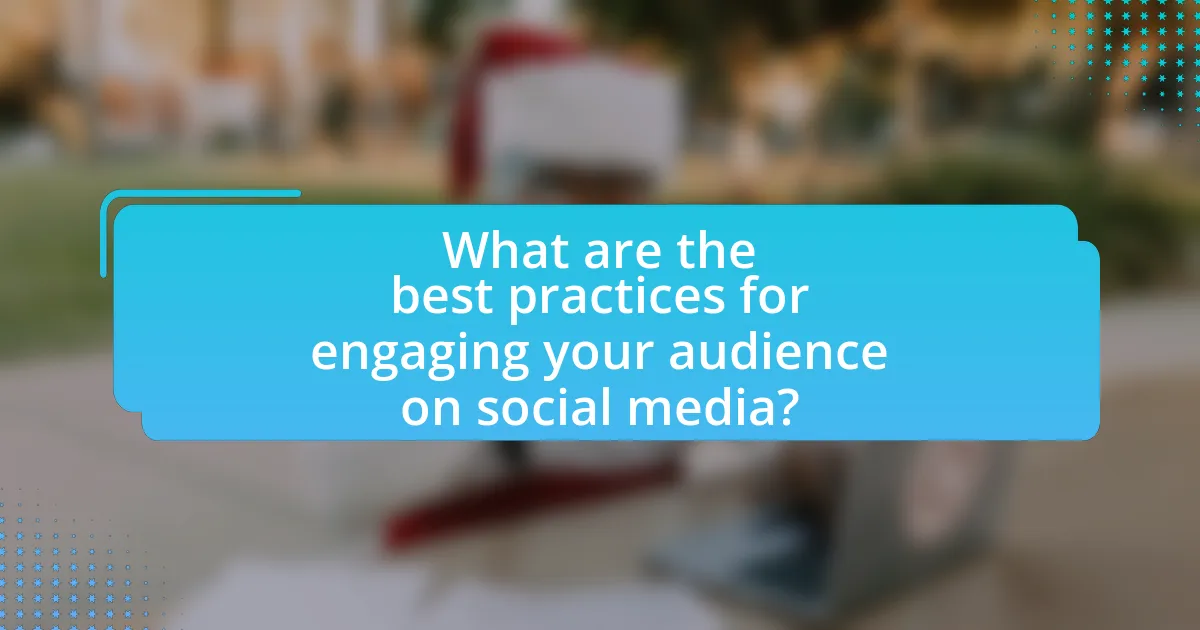
What are the best practices for engaging your audience on social media?
The best practices for engaging your audience on social media include creating interactive content, responding promptly to comments, and utilizing storytelling techniques. Interactive content, such as polls and quizzes, encourages audience participation, which can increase engagement rates significantly. For instance, posts that ask questions or invite followers to share their opinions can lead to higher interaction levels.
Responding promptly to comments and messages fosters a sense of community and shows that you value your audience’s input. Research indicates that brands that engage with their audience in a timely manner see a 20-40% increase in customer satisfaction.
Utilizing storytelling techniques helps to create a narrative around your concert, making it more relatable and exciting for your audience. According to a study by the Content Marketing Institute, storytelling can increase audience engagement by up to 300%. These practices collectively enhance audience interaction and anticipation for events like concerts.
How can you create compelling content that excites your audience?
To create compelling content that excites your audience, focus on storytelling that resonates emotionally and visually engages them. Engaging narratives can enhance audience connection, as studies show that stories are 22 times more memorable than facts alone. Incorporating high-quality visuals, such as behind-the-scenes footage or artist interviews, can further captivate attention and foster anticipation. Additionally, utilizing interactive elements like polls or Q&A sessions on social media platforms encourages audience participation, making them feel involved and valued. This approach not only builds excitement but also strengthens community ties, leading to increased engagement and attendance at your concert.
What types of visuals work best for concert promotion?
High-quality images and engaging videos work best for concert promotion. These visuals capture the energy and atmosphere of live performances, making them more appealing to potential attendees. Research indicates that posts with images receive 94% more views than those without, highlighting the importance of visual content in attracting audience attention. Additionally, behind-the-scenes footage and artist interviews can create a personal connection, further enhancing audience engagement and anticipation for the concert.
How can storytelling enhance audience connection?
Storytelling enhances audience connection by creating emotional resonance and relatability. When narratives are shared, they evoke feelings and experiences that audiences can identify with, fostering a sense of belonging. Research indicates that stories activate the brain’s mirror neurons, which facilitate empathy and understanding, making the audience more engaged. For instance, a study by Paul Zak found that storytelling can increase oxytocin levels, a hormone associated with bonding, thereby strengthening the connection between the storyteller and the audience.
What role do influencers play in building anticipation?
Influencers play a crucial role in building anticipation by leveraging their reach and credibility to generate excitement among their followers. They create buzz through strategic content, such as teasers, behind-the-scenes glimpses, and countdowns, which engage their audience and encourage them to look forward to the event. For instance, a study by the Digital Marketing Institute found that 49% of consumers depend on influencer recommendations when making purchasing decisions, highlighting the effectiveness of influencers in shaping audience expectations and driving interest.
How can you identify the right influencers for your concert?
To identify the right influencers for your concert, analyze their audience demographics, engagement rates, and relevance to your music genre. Influencers with a following that matches your target audience will effectively promote your concert. For instance, if your concert features indie music, seek influencers who specialize in that genre and have a strong connection with their followers. Research shows that 49% of consumers depend on influencer recommendations, highlighting the importance of selecting influencers who resonate with your potential concert-goers.
What strategies can you use to collaborate with influencers?
To collaborate with influencers effectively, identify influencers whose audience aligns with your concert’s target demographic. Establish a mutually beneficial partnership by offering exclusive content, such as behind-the-scenes access or early ticket sales, which can enhance their engagement and provide value to their followers. Research shows that 49% of consumers depend on influencer recommendations, highlighting the potential impact of such collaborations on audience reach and concert anticipation.
How can you leverage user-generated content?
You can leverage user-generated content by encouraging fans to share their experiences and creations related to your concert, which enhances engagement and builds community. For instance, hosting a contest where attendees submit photos or videos from previous concerts can generate excitement and anticipation for the upcoming event. According to a study by Nielsen, 92% of consumers trust user-generated content more than traditional advertising, indicating that authentic fan contributions can significantly influence potential attendees’ perceptions and decisions.
What are effective ways to encourage fans to share their excitement?
Effective ways to encourage fans to share their excitement include creating engaging content that resonates with their interests and emotions. For instance, using behind-the-scenes videos, exclusive sneak peeks, and interactive polls can stimulate fans’ enthusiasm and prompt them to share their experiences. Research shows that content that evokes strong emotional responses is more likely to be shared; a study by the New York Times found that emotionally charged articles receive 30% more shares than neutral ones. Additionally, incentivizing sharing through contests or giveaways can further motivate fans to spread the word about their excitement, as seen in campaigns where participants share posts to enter for a chance to win exclusive merchandise or experiences.
How can you showcase user-generated content to enhance anticipation?
Showcasing user-generated content enhances anticipation by actively sharing fan-created posts, photos, and videos related to the concert. This approach not only builds community engagement but also creates a sense of excitement and involvement among potential attendees. For instance, featuring fan testimonials or behind-the-scenes content can amplify interest, as studies show that user-generated content is perceived as more authentic and trustworthy, leading to increased anticipation. According to a report by Nielsen, 92% of consumers trust organic, user-generated content more than traditional advertising, which underscores the effectiveness of this strategy in generating buzz and excitement for upcoming events.
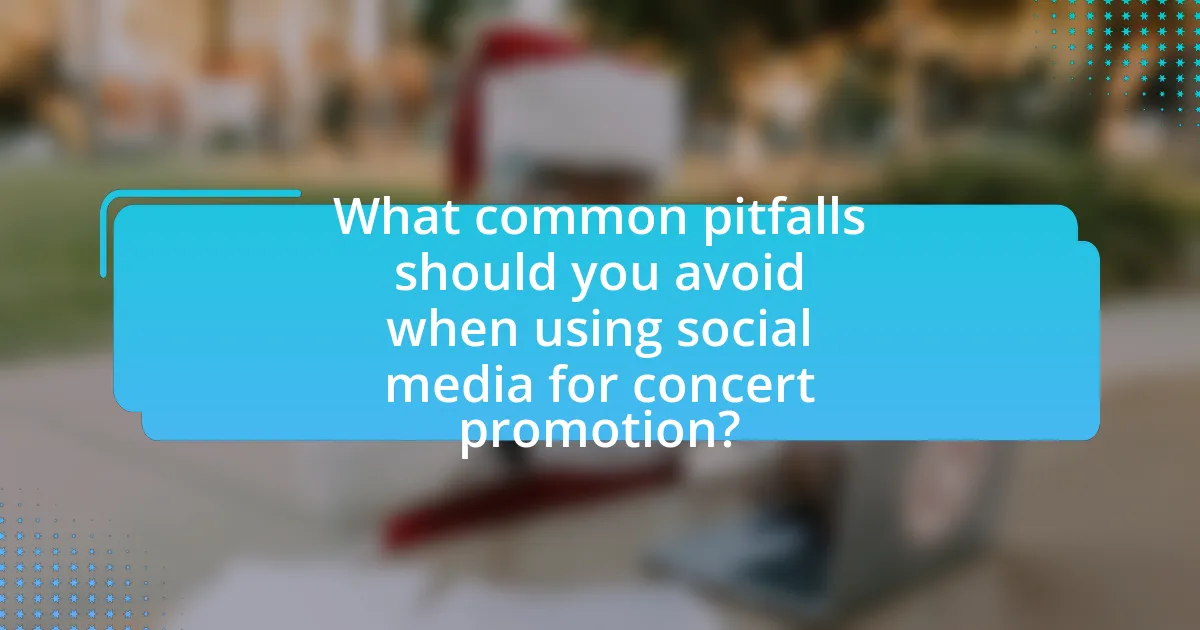
What common pitfalls should you avoid when using social media for concert promotion?
When using social media for concert promotion, avoid the pitfall of inconsistent messaging, as it can confuse your audience and dilute your brand identity. Consistency in tone, visuals, and information across platforms reinforces recognition and trust, which are crucial for effective promotion. Additionally, neglecting audience engagement can lead to missed opportunities for building a community around your concert; responding to comments and messages fosters loyalty and excitement. Lastly, over-promoting can alienate potential attendees; a balanced approach that includes valuable content, such as behind-the-scenes insights or artist interactions, keeps the audience interested without feeling overwhelmed.
What mistakes can undermine your anticipation-building efforts?
Mistakes that can undermine anticipation-building efforts include inconsistent messaging, lack of engagement, and failure to leverage visual content. Inconsistent messaging confuses the audience and dilutes the excitement, as seen when brands fail to maintain a unified theme across platforms. Lack of engagement leads to diminished interest; research shows that posts with higher interaction rates generate more anticipation. Additionally, not utilizing visual content, such as teasers or behind-the-scenes footage, misses opportunities to captivate the audience, as studies indicate that visual posts receive significantly more shares and likes compared to text-only updates.
How can over-promotion negatively impact audience engagement?
Over-promotion can negatively impact audience engagement by leading to audience fatigue and decreased interest. When audiences are bombarded with excessive promotional content, they may feel overwhelmed and disengaged, resulting in a decline in their emotional connection to the event. Research indicates that 60% of consumers report feeling annoyed by brands that over-promote, which can lead to unfollows or disengagement on social media platforms. This disengagement ultimately reduces the effectiveness of promotional efforts and can harm the overall success of the concert.
What are the risks of inconsistent messaging across platforms?
Inconsistent messaging across platforms can lead to confusion among the audience, damaging brand credibility and trust. When different messages are communicated on various platforms, it creates a fragmented understanding of the event, which can result in decreased attendance and engagement. For instance, a study by Sprout Social found that 70% of consumers feel frustrated when they receive inconsistent messages from brands. This inconsistency can also lead to negative perceptions, as audiences may question the reliability of the information provided, ultimately affecting the overall success of promotional efforts for events like concerts.
How can you adapt your strategy based on audience response?
To adapt your strategy based on audience response, actively monitor engagement metrics such as likes, shares, comments, and direct messages across social media platforms. By analyzing these metrics, you can identify which content resonates most with your audience, allowing you to refine your messaging and promotional tactics accordingly. For instance, if posts featuring behind-the-scenes content receive higher engagement, you should increase the frequency of such posts to maintain audience interest. Research indicates that 70% of consumers are more likely to engage with brands that respond to their feedback, highlighting the importance of adapting strategies in real-time to enhance audience connection and anticipation for events like concerts.
What signs indicate that your strategy is working or failing?
Signs that indicate your strategy is working include increased engagement metrics such as likes, shares, and comments on your social media posts, which reflect audience interest and excitement. Additionally, a rise in follower count and ticket pre-sales can signal that your promotional efforts are resonating with your target audience. Conversely, signs that your strategy is failing include stagnant or declining engagement rates, negative feedback from followers, and low ticket sales, indicating a disconnect between your messaging and audience expectations. For example, a study by Sprout Social found that brands with high engagement rates see a 20% increase in sales, reinforcing the importance of active audience interaction as a key indicator of strategy effectiveness.
How can you pivot your approach to better meet audience expectations?
To better meet audience expectations, you can analyze audience feedback and engagement metrics to tailor your content and messaging. By actively monitoring comments, shares, and likes on social media platforms, you can identify what resonates with your audience, allowing you to adjust your promotional strategies accordingly. For instance, a study by Sprout Social found that 70% of consumers feel more connected to brands that respond to their feedback, highlighting the importance of engagement in shaping audience perceptions. This data underscores the effectiveness of a responsive approach in aligning your concert promotion with audience desires.
What are some practical tips for building anticipation for your concert?
To build anticipation for your concert, utilize social media platforms effectively by creating engaging content that teases the event. Regularly post behind-the-scenes footage, countdowns, and sneak peeks of setlists or rehearsals to keep your audience excited. For instance, a study by the Pew Research Center indicates that 69% of adults in the U.S. use social media, making it a powerful tool for reaching potential concert-goers. Additionally, consider hosting interactive sessions such as Q&As or polls to involve your audience in the concert planning process, which can increase their investment in the event.
How can you create a content calendar for effective promotion?
To create a content calendar for effective promotion, start by defining your promotional goals, such as increasing ticket sales or enhancing audience engagement. Next, outline key dates related to your concert, including ticket release, promotional events, and concert day. Then, identify the types of content to share, such as behind-the-scenes footage, artist interviews, and countdown posts, ensuring they align with your goals. Schedule these content pieces across various social media platforms, using tools like Hootsuite or Buffer for automation. Finally, regularly review and adjust the calendar based on audience engagement metrics to optimize future promotions. This structured approach ensures consistent messaging and maximizes audience anticipation leading up to the concert.
What tools can help streamline your social media efforts?
Tools that can help streamline social media efforts include Hootsuite, Buffer, and Sprout Social. Hootsuite allows users to manage multiple social media accounts from one dashboard, schedule posts, and analyze performance metrics, which enhances efficiency. Buffer offers similar functionalities, enabling users to schedule content and track engagement across various platforms, thus saving time. Sprout Social provides comprehensive analytics and reporting features, allowing users to measure the impact of their social media strategies effectively. These tools collectively facilitate better organization, scheduling, and analysis, which are crucial for building anticipation for events like concerts.
